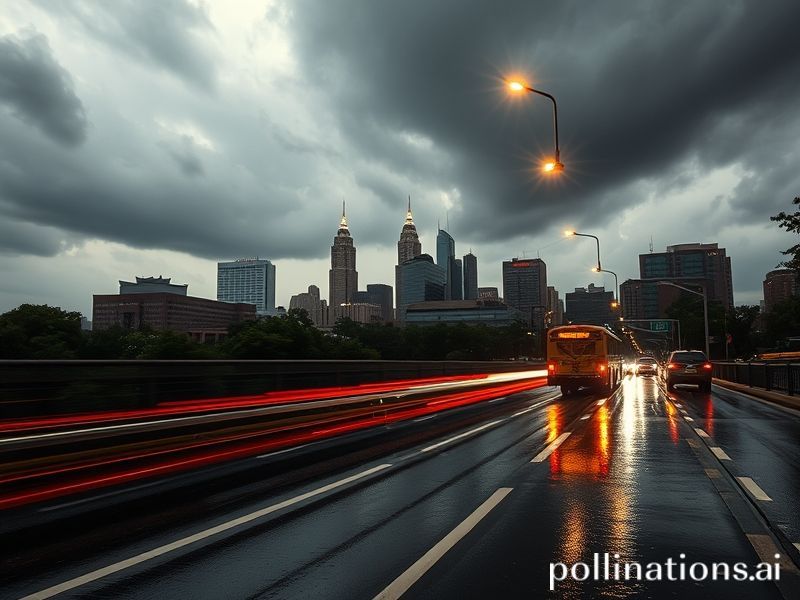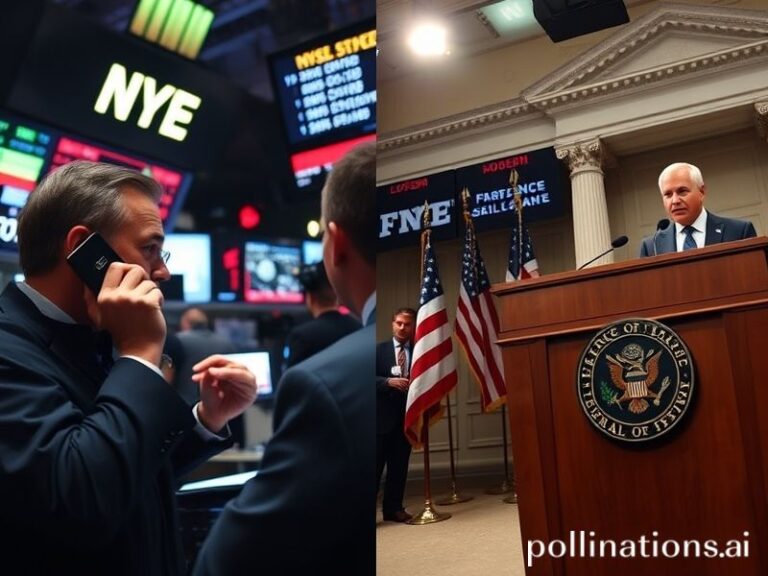Atlanta Weather: How a Humid Southern City Became the World’s Accidental Climate Prophet
ATLANTA — Somewhere between the peach-scented humidity and the sudden, theatrical thunder that makes European tourists think the rapture has arrived, Atlanta’s weather has quietly become a geopolitical barometer no one asked for but everyone now consults. If you want to know how the planet is feeling on any given Tuesday, skip the IPCC report and simply look south of the Mason-Dixon line, where the sky behaves like a hung-over Bond villain: charmingly unpredictable and armed with lethal gadgetry.
For the uninitiated, Atlanta’s climate is best described as a subtropical mood ring. One minute it’s 24 °C and humming with cicadas that sound like malfunctioning drones; the next, a microburst drops an entire Home Depot aisle onto Peachtree Road while CNN’s weather desk politely calls it “isolated showers.” Meanwhile, in Berlin, commuters are cycling through drizzle so civilised it apologises for existing. The contrast is instructive. Atlanta’s theatrics are a preview reel for what happens when the atmosphere finally snaps after decades of being treated like an open sewer.
Consider the supply-chain angle. Last month, a mere two inches of “wintry mix” (translation: slush with delusions of grandeur) shut down Hartsfield-Jackson long enough to strand 1,200 passengers, several of whom missed connecting flights to Davos where they had planned to lecture the world on resilience planning. The ripple effect grounded cargo in Luxembourg and delayed semiconductor shipments to Vietnam, proving once again that the global economy can be kneecapped by anything more aggressive than a light frost in the wrong ZIP code. The World Economic Forum’s subsequent white paper—titled “Weather Volatility as a Strategic Risk”—reads like a ransom note written by a cloud.
Or take immigration. Every August, when the heat index resembles the interior of a tandoor, a small but determined cohort of British expats books one-way flights back to Manchester, trading 38 °C swamp-ass for horizontal rain and existential damp. These reverse migrants aren’t fleeing taxes or politics; they’re fleeing the sensation that God left the cosmic oven on broil. Their departure, dutifully logged by the Home Office under “Other,” subtly alters trans-Atlantic remittance flows and, more importantly, frees up patio seating at Midtown craft breweries.
Water, that old diplomatic lubricant, also factors in. The tri-state “water wars” over Lake Lanier—basically a glorified puddle with a legal team—pitted Georgia against Florida and Alabama in a court battle so protracted it has its own alumni association. When Atlanta’s rainfall dips, as it did during the 2016 drought that left houseboats stranded in cracked red clay, downstream oystermen in Apalachicola Bay start Googling “second career options.” The oysters, meanwhile, adopt the same shell-shocked stare seen on commuters watching their Uber surge price climb faster than the humidity.
And then there’s the branding issue. Singapore, ever the industrious city-state, markets itself as “air-conditioned nation.” Atlanta, by contrast, markets itself as “Visit for 48 hours, lose four pounds of water weight, and rethink your life choices.” This is not entirely fair. The city has installed 200 new heat sensors and appointed a Chief Heat Officer, a title that sounds like a rejected Marvel sidekick but signals earnest intent. Still, when your sustainability plan includes handing out misting fans at bus stops, you’re essentially treating the symptom while the patient sweats through the sheets.
Internationally, Atlanta’s weather has become a dark-comedy shorthand for American excess: too much sky, too much water, too much everything, delivered with evangelical fervour. A Swiss climatologist told me, half-admiringly, “Atlanta is what happens when meteorology joins TikTok.” He was nursing a spritz, I was nursing a heat rash, and we both understood that the joke was on us.
So as another afternoon darkens into apocalypse-by-PowerPoint, take a moment to salute this humid, unruly city. It is where the jet stream meets the street grid, where climate futures are stress-tested in real time, and where the forecast always ends with the same poignant punch line: “Tomorrow? More of the same, but with extra drama.” The rest of the world should probably bring an umbrella. Or a passport.







